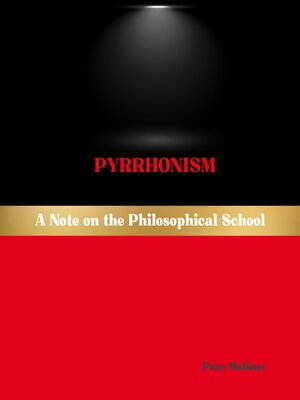Pyrrhonism
audiobook (Unabridged) ∣ A Note on the Philosophical School · Western Philosophical Schools
By Pons Malleus

Sign up to save your library
With an OverDrive account, you can save your favorite libraries for at-a-glance information about availability. Find out more about OverDrive accounts.
Find this title in Libby, the library reading app by OverDrive.



Search for a digital library with this title
Title found at these libraries:
| Library Name | Distance |
|---|---|
| Loading... |
This audiobook is narrated by a digital voice.
The pursuit of truth has long stood at the heart of philosophical inquiry. Across centuries and civilizations, thinkers have proposed countless theories, constructed elaborate systems, and argued fervently for the validity of their conclusions. Amidst this cacophony of certainty, Pyrrhonism emerges as a voice of quiet restraint, reminding us that perhaps the truest wisdom lies not in asserting what we know, but in understanding the limits of knowledge itself.
This audiobook is dedicated to exploring Pyrrhonism, a school of thought founded in ancient Greece by Pyrrho of Elis (c. 360–270 BCE), whose teachings have often been overshadowed by more assertive philosophical traditions. Pyrrho's fundamental insight was startlingly simple yet profoundly radical: in the face of conflicting claims and the unreliability of our senses and reasoning, the most rational stance is one of epoché—the suspension of judgment. Unlike dogmatic skeptics who deny the possibility of knowledge, Pyrrhonists refrain from both affirmation and denial, cultivating a state of mental tranquility (ataraxia) through philosophical detachment.
At a time when opinions harden rapidly and intellectual humility is often in short supply, Pyrrhonism offers a compelling antidote. It challenges our deepest assumptions—not by replacing them with new doctrines, but by inviting us to dwell in a space of open inquiry, where questions are valued more than answers and uncertainty is embraced rather than feared. This approach is not an abdication of reason, but a disciplined, rigorous method of inquiry that resists the allure of premature conclusions.







